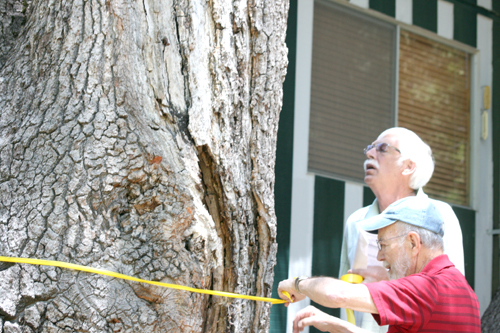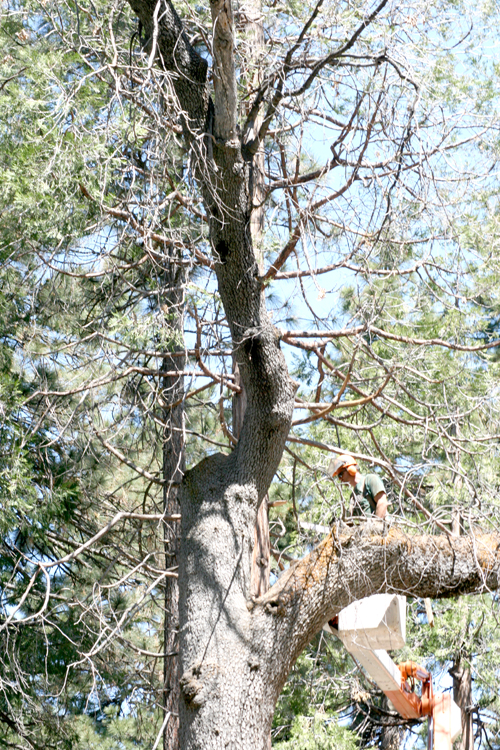
The current count of Goldspotted oak borer infested trees stands at 11, with the majority of those in Idyllwild. On Friday, May 18, crews removed a large infested oak in Pine Cove in the 23000 block of Pine Needles Lane. Because of the size of the oak and proximity to a residence, a crane had to be used as part of the removal process.
The present CAL FIRE GSOB program pays for 100 percent removal of diseased GSOB trees. Funds are federal dollars, called a State Fire Assistance grant, and are awarded to Riverside County for hazardous fuel reduction, according to CAL FIRE Forester Chief Gregg Bratcher. There are two caveats important to local property owners: if CAL FIRE removes the trees using designated grant money, all wood must be taken away from the site. No firewood would be left for landowner. Also, grant funds, unless reauthorized, end in September, after which, landowners would be responsible for cost of infested oak removal. Removal costs, depending on tree size, location and necessary equipment can range from $1,500 to $3,000.
As local oaks begin growing new leaves, Mountain Community Fire Safe Council Goldspotted oak borer inspection teams have another element to check on their inspection forms — canopy health. Comparative leafiness of an oak’s crown, thin and spotty compared to other oaks in the same area with more robust canopies, is one indicator of an ailing tree. FSC Teams have already inspected 212 oaks on 44 area properties.
Last week, Pat Boss and Don Patterson inspected two black oaks on Hemstreet Place. The older and larger of the two, showed sufficient markers, including thinning canopy and at least five D-shaped exit holes, that the team marked it for subsequent CAL FIRE inspection. The tree was old, around 200 years thought Patterson, already hollowing out on one side and showing signs of overall general weakness. The smaller tree, although adjacent, showed no obvious signs of Goldspotted oak borer infestation. Boss estimated the candidate tree is less than a mile from the oak across from the American Legion that was removed, and is arguably part of that same micro zone of infestation.

But Boss noted Goldspotted oak borer beetles are not known to fly long distances or move too far from a tree that is still productively hosting them. So how this tree became infected, whether from firewood brought in, or from nearby beetles is unknown.
What is known is that older, larger black oaks, already in a weakened state, are strong candidates for Goldspotted oak borer occupation. Local property owners with black oaks should check tree canopies, a more obvious indicia of tree decline, than others used by FSC inspection teams. If your tree canopy looks thin and is not fully filled out, contact the GSOB hotline to arrange an inspection.
Forest Service Entomologist and lead GSOB researcher Tom Coleman advises concerned property owners who want to learn about current science in combatting Goldspotted oak borer should consult “Pest Notes” at www.gsob.org. At a recent Idyllwild GSOB education session, the “take home” message on one of the featured slides was: “read the GSOB Pest Note; there is no silver bullet for managing GSOB; ground surveys can be very effective for detecting GSOB; current insecticide research has been effective in the lab (but not yet in the field); grinding or tarping firewood can eliminate GSOB populations (if the tarping is secure and won’t develop holes); leave wood on site for two years before moving it (two years is the length of time GSOB can survive in firewood) and bio-control research is ongoing.”
University of California Riverside’s Mark Hoddle, who works with Coleman on Goldspotted oak borer research, was asked about bio-control and whether there are current native California enemies effective against the beetle. Goldspotted oak borer predators found in Arizona (“parasitoids”) that attack the beetle’s eggs and larvae and seem to hold it in check are not effective in California, according to Hoddle, in stemming the advance of Goldspotted oak borer.
“Parasitism levels appear to be low in Arizona, based on the limited surveys we have done. This low level of attack is unlikely to be sufficient to effectively control GSOB in California,” Hoddle believes. “Native [California] oaks have not co-evolved with a wood boring beetle like GSOB [as oaks have in Arizona] and they [California oaks] might therefore be very sensitive to this kind of attack. So a combination of low levels of parasitoid and predator activity and host plant resistance [in Arizona] in combination may be what holds GSOB at low levels.”
Regarding if and when Goldspotted oak borer enemies from Arizona could be introduced into California, Hoddle said, “No natural enemies will be introduced from Arizona to California until we have run safety tests on bio-control agents that we think have the potential to be useful. These studies will take years to complete in quarantine if we start them.”
Tree removal is the most effective way to currently stop spread to additional trees. Some insecticide sprays have shown effectiveness in laboratory tests. And firewood from a diseased tree must be tarped and sealed in such a way that beetles cannot emerge for a two year period. During that time, firewood should not be moved.
For a GSOB inspection, call (951) 659-8328.










